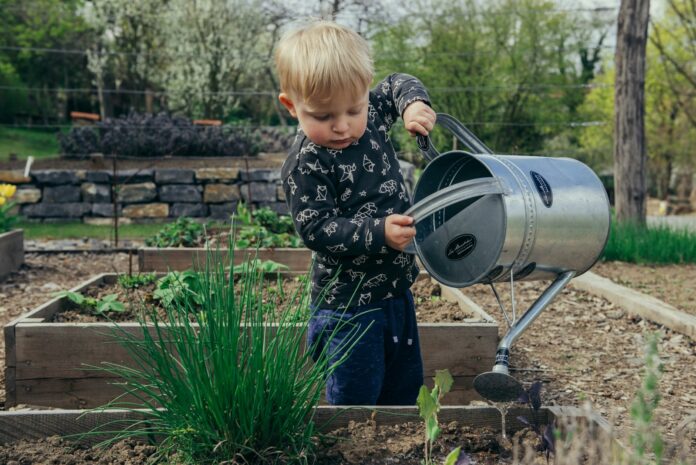Gardening is more than just a way to beautify your surroundings – it’s a full-body workout that enhances strength, flexibility, and cardiovascular health. Digging, planting, weeding, and raking engage multiple muscle groups, providing a low-impact, functional fitness routine that feels less like exercise and more like a rewarding hobby.
For those seeking gentle, consistent movement, gardening offers a unique way to stay active, build endurance, and reduce stress. Best of all, it combines physical exertion with mental relaxation, making it a holistic fitness activity.
The Fitness Benefits of Gardening
1. Full-Body Strength and Toning
Gardening involves a variety of movements – lifting, squatting, pulling, and pushing – all of which engage the core, legs, arms, and back. Regular gardening helps:
- Tone muscles through repetitive digging, planting, and weeding.
- Enhance grip strength by handling tools, pulling weeds, and carrying plants.
- Build functional strength that supports everyday activities.
“Who needs the gym when digging a hole can sculpt your arms and legs at the same time?”
2. Cardiovascular Health and Endurance
Gardening activities like raking, mowing, and turning soil elevate heart rate, improving cardiovascular health.
- Raking and Mowing: Mimic the motion of rowing or cycling.
- Weeding and Digging: Sustain moderate activity for extended periods, promoting endurance.
3. Improved Flexibility and Mobility
Stretching to plant flowers, bending to weed, and reaching for branches enhance joint mobility and flexibility. This reduces stiffness and improves overall range of motion.
- Frequent Bending and Twisting: Promotes spinal mobility.
- Lunging to Plant: Increases hip flexibility and balance.
4. Enhanced Balance and Coordination
Balancing on uneven surfaces, carrying tools, or maneuvering wheelbarrows improves stability and coordination – crucial for preventing falls and enhancing athletic performance.
- Standing on One Leg (while digging): Strengthens stabilizer muscles.
5. Mental Health Benefits
Gardening reduces stress, anxiety, and depression by engaging the mind and body in a calming, productive task.
- Connection to Nature: Lowers cortisol levels (stress hormone).
- Focus and Relaxation: Promotes mindfulness, similar to yoga or meditation.
👉 Support recovery with Myprotein’s BCAA blends – perfect for replenishing muscles after gardening. Explore options at Myprotein.
Gardening as a Calorie-Burning Workout
| Activity | Calories Burned (30 min) |
|---|---|
| Digging | 150-200 |
| Raking Leaves | 120-175 |
| Mowing (Push Mower) | 135-200 |
| Weeding | 130-180 |
| Planting and Watering | 100-150 |
👉 A few hours in the garden can burn as many calories as a light gym session.
Best Gardening Activities for Fitness
1. Digging and Shoveling
- Focus: Core, legs, and upper body.
- Muscles Engaged: Quads, hamstrings, shoulders, and abs.
- Tips: Use both sides of the body to avoid muscle imbalances.
2. Weeding and Pruning
- Focus: Flexibility and grip strength.
- Muscles Engaged: Forearms, shoulders, and lower back.
- Tips: Alternate between kneeling and squatting to engage different muscles.
3. Raking and Mowing
- Focus: Cardiovascular endurance and upper body strength.
- Muscles Engaged: Shoulders, arms, and back.
- Tips: Use long, sweeping motions to increase core engagement.
4. Carrying Soil, Pots, and Tools
- Focus: Functional strength.
- Muscles Engaged: Arms, shoulders, back, and legs.
- Tips: Lift with your legs, not your back, and carry items close to your body.
5. Planting and Watering
- Focus: Balance, squatting, and coordination.
- Muscles Engaged: Core, thighs, and glutes.
- Tips: Perform lunges while planting to engage the lower body further.
Turning Gardening into a Structured Workout
| Exercise | Duration | Reps/Sets |
|---|---|---|
| Digging Rows for Plants | 10 min | 3 sets |
| Squat and Plant (Lunges) | 15 min | 3 sets |
| Raking Leaves | 20 min | Continuous |
| Watering with Buckets | 10 min | 2 sets |
| Wheelbarrow Push | 5 min | 3 sets |
Gardening Safety Tips to Prevent Injury
- Warm-Up Before Starting – Light stretching or walking prepares the body.
- Engage Core Muscles – Protect the lower back by bracing your core during lifting and bending.
- Use Proper Tools – Ergonomic gardening tools reduce strain on joints.
- Alternate Sides – Switch hands when raking or digging to prevent muscle imbalances.
- Hydrate Frequently – Stay hydrated, especially during hot weather.
- Listen to Your Body – Rest when needed, and avoid overexertion.
👉 Replenish with hydration and electrolyte supplements from Myprotein.
Mental and Emotional Benefits of Gardening as Exercise
- Boosts Mood: Exposure to sunlight increases serotonin and vitamin D levels.
- Reduces Anxiety: Gardening’s repetitive nature promotes relaxation, similar to meditation.
- Enhances Creativity: Planning garden layouts and plant designs stimulate the mind.
- Promotes Social Connection: Gardening with friends or participating in community gardens builds relationships.
Incorporating Gardening into Your Fitness Routine
- Set Weekly Gardening Goals: Aim for 2-3 sessions lasting 30-45 minutes.
- Track Progress: Measure improvements in muscle tone, energy, and flexibility.
- Combine with Traditional Workouts: Use gardening as an active rest day or light cardio session.
News Box: Gardening and Fitness Trends
Explore how gardening can boost overall fitness at News Box. Learn about the growing trend of using gardening as part of holistic health practices.
Conclusion: Cultivate Health While Growing Your Garden
Gardening transforms ordinary tasks into calorie-burning, muscle-toning workouts that benefit both body and mind. By engaging in gardening regularly, you not only cultivate plants but also cultivate better health, reduced stress, and increased strength.
“Let your garden grow – and let your health flourish alongside it.”
👉 Enhance your recovery with Myprotein supplements at Myprotein. Keep your body nourished while you nurture your garden!

